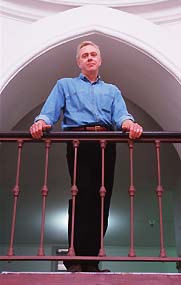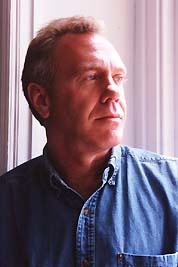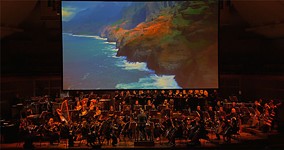The Emperor Jones
By Robi Polgar, Fri., April 30, 1999
|
|
This year, then, has been a quiet triumph for the actor-director, who has worked hard to reclaim his place after taking a five-year leave from theatre in the early Nineties. In the last year, Jones has worked almost without pause on several acclaimed projects, beginning last summer with his tautly directed Travels With My Aunt for Different Stages. In March, he directed the premiere of Woman at the Window, written by his wife, Cyndi Williams, for the Refraction Arts Project. Onstage, he has been even busier: singing with The Barkers in Refraction's revival of Durrenmatt's The Visit; stealing comic moments as Ford in Subterranean Theatre Company's staging of Nicky Silver's The Food Chain; brooding ominously as cuckolded husband Robert in The Public Domain's production of Pinter's Betrayal; and now playing Richard, the partner of a dying man surrounded by family, in Daniel MacIvor's The Soldier Dreams, which Subterranean opens this weekend.
Jones is naturally disarming, understating his importance to these various projects or to the Austin theatre scene. "I'm blessed," he'll say repeatedly. Others, however, find much in Jones to praise: his gift for delving deeply into a character, for creating an extension of himself; his willingness to do anything to ensure a production's success; and the confidence he exudes as he works.
Jones' acting appears effortless. "He's a craftsman," says Michael Stuart, who has observed Jones' work since they were undergraduates at St. Edward's University in the late Seventies. "To say his performances are workmanlike almost sounds like an insult." But it's hard to pin down how Jones makes it look so easy; what comprises his style?
"I don't know," muses Jones, "What is my style? You tell me." Then he adds, "I'm still learning," like a good craftsman. He will point out that "there are certain characters, certain types of characters, that I mesh with. Like Robert in Betrayal; for some reason, that really struck a chord. When I did Jamie in Long Day's Journey Into Night, that also really struck a chord with me." Jones is enigmatic about the sound of that chord, but others hear it clearly.
"His performances are so rich," says Ken Webster, artistic director of Subterranean, who has directed Jones eight times. "In Bleacher Bums, he played Marvin, the nastiest man alive. Lots of actors could have played the evil aspect of his character, but David somehow managed to make him truly sympathetic as well. As the play ends, Marvin sits alone and friendless, and it was utterly heartbreaking every night."
For audiences watching him act, Jones adds a particular tension of credibility. For an actor sharing the stage with him, the effect of his confidence and depth can be exhilarating, if not a little frightening. "It is stronger and stranger and more interesting," says Katherine Catmull, who has played opposite Jones twice this year. "He brings his whole self, which is very cool. During Betrayal, in the transition when I would pour his wine at the restaurant table, he gave me a look that chilled me right down to the floor every night. I mean, every night -- isn't that something? Usually, as you get to know each other's little moments, they aren't so compelling, but if you actually do it freshly every night, it can't help but be. And David did.
"During Sin," continues Catmull, recalling Subterranean's 1996 production of Wendy McLeod's wacky, apocalyptic comedy, "we had a scene at a bar where he would do the music from TheMod Squad and make the salt and pepper shakers do a little chasing dance until the salt fell over and the pepper cried out, 'Julie!' Of course, this is funny, but David made it freshly funny every night. I was supposed to laugh, and damn if I ever had to fake it, because every night he played it so mischeviously."
Jones' ability to create compelling characters also informs his directorial preparation and execution. Says actor Doug Taylor, "He can really pull things out of an actor -- you know how lazy actors can be. They'll say, 'This is what I'm going to do,' and David will say, 'Well, you know, if you did just a little bit more ...'" Taylor laughs. "He's really got a good eye for actors, and I think it's because he's a good actor and knows how to translate what a director needs into what an actor needs."
Jones spends a long time preparing to direct a play. Staging two this year was a challenge for the detail-oriented director for whom the simplest juxtaposition of bodies can elicit a powerful, subconscious response in an audience, something he learned from Ed Mangum while at St. Edward's. "Telling the story through motion, painting through motion," is how Jones describes his directing. Every gesture is ripe with meaning, and Jones carefully exploits each one. His deft handling of the actors' movements in Travels With My Aunt allowed the unwieldy, practically uncut novel to flow briskly as a four-actor play. Cyndi Williams praises Jones for his creative staging of her Woman at the Window, particularly the final moment: "I loved it. The ending image of [actress Anne Hulsman] walking out the window was completely David's idea. I heard so many different interpretations of what it meant, and I liked that it wasn't definite -- although everyone felt very strongly that their opinion was the correct one."
Jones has experience as a producer, too, and is often seen at the theatre lending a hand, caring for a play in all its facets. "You know," offers Catmull, "David's just a good guy to have around a theatre. He's a fixer. He can't help himself from sorting out problems if he sees them. He's kind of old-fashioned in that way, which goes along nicely with that craggy Ponca City cowboy look he's working."
Ponca City, Okla., is a small town whose population consists mostly of people who work at the huge Conoco Oil Company refinery there. Jones' father was an accountant with Conoco when Jones was growing up. Both his parents were children of the Depression who sought "good, safe ways to earn money. But they really got into theatre in college," says Jones. "And in Ponca City, it was a good way to get to know some of the different people involved in the oil company." Jones grew up in an environment where the theatre was a staple, even ordinary aspect of life: "My parents were always having parties at our house for the shows they were in." Just as a church might draw like-minded people from the various strata of Ponca City's populace, so did the community's theatre give its creative souls a place to meet, to party, and to put on plays.
|
|
After high school, Jones followed friends to Cedar Rapids, Iowa, where they enrolled in Coe College, in a small fine arts college. "I majored in art and actually did a lot up there. But I really didn't seem to enjoy living in the frozen North. I'd always been drawn to Austin. One of my directors at the community theatre had studied under B. Iden Payne and had told wonderful stories about Austin. And my sister, who was a big hippie, had always spoken highly of Austin, so I came down to check out St. Ed's, and said, 'Yup, this is it.'
"I majored in theatre with an emphasis in directing and graduated in 1980, magna cum laude, which," he adds with a Ponca City cowboy drawl, "is not hard to do at St. Edward's in theatre. But one of the best things about St. Edward's was studying under Edward Mangum, who established the theatre department. He was one of the founders of Arena Stage in Washington, D.C. He's the one who brought the stars to St. Edward's. I worked with a few really good professionals: I got to understudy John Carradine for Tobacco Road. He was a wonderful actor, but you got to know his personal side, too. He had these gnarled hands that were literally like claws, because he had arthritis, but" -- Jones' drawl gets the better of him -- "he could still pinch a waitress.
"The day I graduated from St. Edward's, I got cast in Annie Get Your Gun, which was performing at the Country Dinner Playhouse. It, quote unquote, toured up to Dallas," where Jones stayed following the show's run to find commercial work. "And I just hated Dallas so bad that I went home to save up my money, so I could go to New York. And the nine months I spent back at home in Ponca City, I just was so bored and I was so homesick for Austin that, by the time I had a decent amount of cash saved up, I said, 'Screw New York, I'm going back to Austin.' I fell in love with it. I decided to stay."
Along with St. Edward's classmates Joe York, Michael Stuart, and Bill McMillan, David Jones insinuated himself into the local theatre scene and became a fixture. "For people who arrived after 1980, these guys have always been there," says Austin Chronicle arts editor Robert Faires of the St. Ed's quartet, "and you forget that." Praising their it-looks-so-easy talents, he adds that an actor like Jones "can be taken for granted, like a straight man in a comedy team. You forget about the skill needed to be the set-up man."
By 1990, Jones was a successful, expected presence on Austin's stages. He was also playing guitar and fronting the up-and-coming band Big Ed. "I was working all the time in Austin theatre, up until 1991. Cat on a Hot Tin Roof was the last show I did. I decided, 'The band's starting to take off a little bit, I'm going to stop doing theatre.'" For five years, Jones concentrated his energies on the band, experiencing success, then disappointment. Big Ed rose, fell, and finally broke up in 1995. Jones assesses his years spent with the band philosophically: "It was a very interesting trip, both rewarding and one of the most painful experiences I've ever gone through. I burned out pretty hard on music after Big Ed broke up." He adds wryly, "I was pretty crispy."
As Jones took stock of the scene following the breakup of Big Ed, he saw a stark contrast to the theatre community he'd left: "I had been doing theatre so consistently in Austin since the early Eighties that I had finally built myself to the point where I could audition and get the leading roles that paid well." Now the scene was less familiar, with new companies emerging and changes in the old guard.
It was longtime directors Norman Blumensaadt and Ken Webster, recalling Jones' acting ability from before his musical escapade, who helped the actor reclaim his stage status. "I pretty much did have to start all over again," remembers Jones. "Ken Webster was still in operation, so he knew me. And I'd worked with Norman Blumensaadt. I had to audition for [Different Stages'] Mad Forest, which was the first show I did after the band broke up, and I think Sin [with Subterranean] was the next show I did after that. Sin was very well received by the audience. And that gave me some exposure and let people know that I was coming back."
"All actors get better with age," Webster grins, assessing Jones' return to theatre. "I always used to see him as villains because of that voice, but after the five years, it became clear to me that he was more versatile than I was giving him credit for -- and I started casting him in more sympathetic roles. He's not scared of taking risks and nobody's more serious about acting that I've worked with in town."
Jones is currently acting in Webster's production of The Soldier Dreams. Webster cast Jones and Cyndi Williams -- real-life husband and wife -- as the lover and the sister of a dying man. "Ken said he was going to cast us as husband and wife, but he didn't think it would be believable," laughs Jones. "But it's one of the few shows where Cyndi and I actually have some decent scenes together on stage."
"There's a party at David and Cyndi's" might be the battle cry of the Austin theatre scene, as the couple have hosted countless cast parties over the years, in effect carrying on Jones' parents' convivial tradition. "It isn't really a play in Austin unless they have a party -- sometimes more than one," says Doug Taylor. "It's a great networking opportunity; and when you're in a show, it's a great way to catch up on the goings-on."
Jones has known Williams for 15 years. She first noticed him in 1981 in his first show after he made the final move to Austin. In Bent, at the Ritz, he came onstage clad only in a leather thong. "I have to talk to a guy usually before I find him attractive," she says. "But he walked out and I thought, 'Oh! What an attractive man!' But we didn't actually meet for a couple of years after that." The two have been together ever since. "I think we had one date," recalls Jones with a smile, "and then we moved in together."
Williams acts and writes, Jones acts and directs, and while they share theatre between them, they have a healthy sense of each other's needs. Says Williams, "I feel really fortunate because a lot of people who are both in creative endeavors can clash about the time, and we really don't. And I like working with David. As a director, I really trust him; I see where he's coming from and I like his approach."
Jones works for the Internal Revenue Service -- "producing corporate videos for Big Brother," he jokes. But he enjoys the work, seeing it as one more outlet for his creativity. When asked if he had a master plan to find a job in Austin and work in the theatre as a labor of love, Jones responds, "I don't know if I ever clearly at any one time decided to do that. The first year that I went to school, I majored in art because theatre didn't even cross my mind as a profession. It's always been this refuge for me, always been a place where I can go and really enjoy myself or explore different things. What became my master plan was that I loved doing theatre."
As for the future, Jones is here to stay: "As I'm growing up and looking around at things, I guess it really has sunk in, because I kind of vacillated for a while, theatre to music and back to theatre again. Well, theatre's not going to go away, and I think, well, it would be a smart investment to get something tangible in place. I would really like to have a theatre in South Austin. The area that I'm living in now is like my small town, and I draw a certain amount of comfort from it.
"When I think about 20 years down the road" -- Jones' Ponca City drawl thickens -- "I think when you hit 40, you start lookin' down the road a little more than you used to. If I start working on something now, just think where it will be 20 years from now."
The Soldier Dreams runs April 29-May 22, Thu-Sat, 8pm, at Hyde Park Theatre, 511 W. 43rd. Call 454-TIXS.










